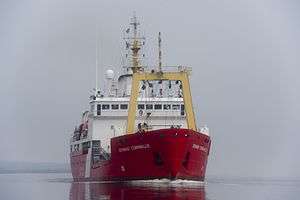CCGS Edward Cornwallis
CCGS Edward Cornwallis[lower-alpha 1] is a Martha L. Black-class icebreaker of the Canadian Coast Guard. She serves as a light Icebreaker and buoy tender on the East Coast of Canada. Entering service in 1986, the vessel is homeported at Dartmouth, Nova Scotia. The vessel is named after Lieutenant General Edward Cornwallis, a British Army officer and founder of Halifax, Nova Scotia.
 Edward Cornwallis in May 2012 | |
| History | |
|---|---|
| Name: | Edward Cornwallis |
| Namesake: | Edward Cornwallis |
| Operator: | Canadian Coast Guard |
| Port of registry: | Ottawa, Ontario |
| Builder: | Marine Industries, Tracy, Quebec |
| Yard number: | 450 |
| Launched: | 24 February 1986 |
| Commissioned: | 14 August 1986 |
| In service: | 1986–present |
| Homeport: | CCG Base Dartmouth (Maritime Region) |
| Identification: |
|
| Status: | in active service |
| General characteristics | |
| Class and type: | Martha L. Black-class light icebreaker and buoy tender |
| Tonnage: | |
| Displacement: | 4,662 long tons (4,737 t) full load |
| Length: | 83 m (272 ft 4 in) |
| Beam: | 16.2 m (53 ft 2 in) |
| Draught: | 5.75 m (18 ft 10 in) |
| Ice class: | Arctic Class 2 |
| Propulsion: | Diesel-electric AC – 3 Alco 251F-16V |
| Speed: | 16 knots (30 km/h) |
| Range: | 6,500 nmi (12,000 km) at 13.7 knots (25.4 km/h) |
| Endurance: | 120 days |
| Complement: | 25 |
| Sensors and processing systems: | 1 × Racal Decca Bridgemaster navigational radar (I band) |
| Aircraft carried: | 1 × MBB Bo 105 helicopter |
| Aviation facilities: | Flight deck and hangar |
Design and description
Edward Cornwallis and sister ship CCGS Sir William Alexander differ from the rest of the class by having one less deck in the superstructure and their buoy-handling derricks mounted forward.[2] Edward Cornwallis displaces 4,662 long tons (4,737 t) fully loaded with a 3,727.2 gross tonnage (GT) and a 1,503.0 net tonnage (NT). The ship is 83.0 metres (272 ft 4 in) long overall with a beam of 16.2 metres (53 ft 2 in) and a draught of 5.8 metres (19 ft 0 in).[3][4]
The vessel is powered by is propelled by two fixed-pitch propellers and bow thrusters powered by three Alco 251F diesel-electric engines creating 8,847 horsepower (6,597 kW) and three Canadian GE generators producing 6 megawatts of AC power driving two Canadian GE motors creating 7,040 horsepower (5,250 kW).[3][4] The ship is also equipped with one Caterpillar 3306 emergency generator, and one Caterpillar 3508 auxiliary generator. This gives the ship a maximum speed of 16 knots (30 km/h). Capable of carrying 783.7 long tons (796.3 t) of diesel fuel, Edward Cornwallis has a maximum range of 6,500 nautical miles (12,000 km) at a cruising speed of 13.7 knots (25.4 km/h) and can stay at sea for up to 120 days. The ship is certified as Arctic Class 2.[4]
The icebreaker is equipped with one Racal Decca Bridgemaster navigational radar operating on the I band. The vessel is equipped a 980 m3 (35,000 cu ft) cargo hold. Edward Cornwallis is equipped with a flight deck and a hangar that can house two light helicopters of the MBB Bo 105 or Bell 206L types.[4] However, the vessel is only allotted one helicopter.[3][4] The ship has a complement of 25, with 10 officers and 15 crew. Edward Cornwallis has 9 additional berths.[4]
Operational history
The ship was constructed by Marine Industries at their yard in Tracy, Quebec with the yard number 450.[5] Edward Cornwallis was launched on 24 February 1986 and entered service on 14 August 1986.[3][5] The ship is registered in Ottawa, Ontario, and homeported at Dartmouth, Nova Scotia.[3][4]
On 17 December 2007, Edward Cornwallis was dispatched to recover the 140-metre (459 ft 4 in) barge Houston carrying diesel fuel that had cast adrift in St. George's Bay near Port Hood, Nova Scotia. Facing 70 km/h (43 mph) winds and 5-metre (16 ft) waves, members of the crew boarded the barge. They rescued the crew and kept the barge from going aground until a tugboat arrived on 19 December. Five members of the crew were later awarded medals for their efforts.[6]
On 2 March 2020, Shelburne Ship Repair was awarded a $12.1 million contact to refit Edward Cornwallis at their yard in Shelburne, Nova Scotia. Work was expected to begin in April and last until January 2021.[7]
References
Notes
- CCGS stands for Canadian Coast Guard Ship
Citations
- Meloney, Nic (30 June 2020). "Mi'kmaq to rename coast guard's Edward Cornwallis icebreaker". CBC News. Canadian Broadcasting Company. Retrieved 30 June 2020.
- Maginley & Collin 2001, p. 177.
- Saunders 2004, p. 95.
- "CCG Fleet: Vessel Details – Edward Cornwallis". Canadian Coast Guard. Archived from the original on 6 August 2014. Retrieved 26 November 2016.
- "Edward Cornwallis (8320470)". Miramar Ship Index. Retrieved 27 November 2016.
- Bresge, Adina (12 July 2016). "Coast Guard crew honoured for 'nick of time' heroics that prevented catastrophe". CTV News. The Canadian Press. Archived from the original on 25 February 2018. Retrieved 25 February 2018.
- Johnson, Kathy (2 March 2020). "Shelburne Ship Repair awarded $12.1-million contract for CCGS Edward Cornwallis retrofit". Cape Breton Post. Retrieved 29 March 2020.
Sources
- Maginley, Charles D. & Collin, Bernard (2001). The Ships of Canada's Marine Services. St. Catharines, Ontario: Vanwell Publishing Limited. ISBN 1-55125-070-5.CS1 maint: ref=harv (link)
- Saunders, Stephen, ed. (2004). Jane's Fighting Ships 2004–2005. Alexandria, Virginia: Jane's Information Group. ISBN 0-7106-2623-1.CS1 maint: ref=harv (link)
External links
| Wikimedia Commons has media related to CCGS Edward Cornwallis. |